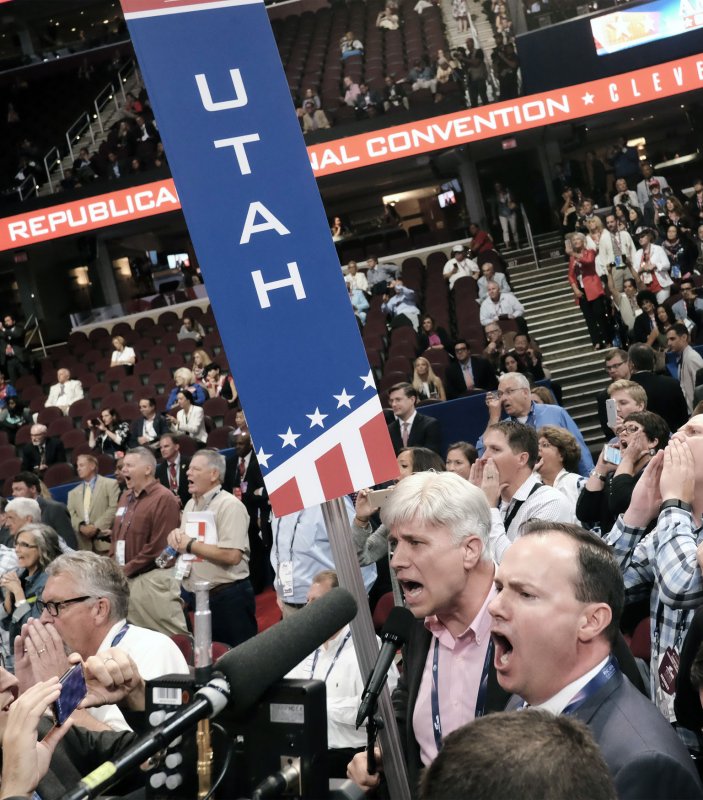1 of 3 | Utah Sen. Mike Lee, right, stands with his party's delegation head Phil Wright, shouting for recognition from the chair at the Republican National Convention inside Quicken Loans Arena in Cleveland on Monday. Lee helped lead a floor fight challenging the party's proposed rules package, which guaranteed a smooth nomination for Donald Trump, and that will govern party business for the next four years. Lee's attempt ended in failure after an acrominous few minutes of shouting form both sides. Photo by Pete Marovich/UPI |
License Photo
CLEVELAND, July 18 (UPI) -- The Republican National Convention gaveled into session in Cleveland Monday with a brief but heated floor fight from conservative activists and anti-Donald Trump forces seeking to press a procedural point that could have served to embarrass the presumptive nominee.
Conservatives at the convention worked quietly to gather signatures from a majority of delegates in several states that would have forced a lengthy roll call vote to adopt the party's new rules.
Two conservatives who supported former presidential candidate Sen. Ted Cruz appeared to lead the effort on the convention floor -- Utah Sen. Mike Lee and former Virginia Attorney General Ken Cuccinelli.
The sitting chair overseeing the convention asked for a voice vote to adopt the rules, which govern how the convention itself will be conducted and how the party will operate over the next four years. As the question was posed, the convention erupted into shouting from both sides. A raucous voice vote ensued. The chair proclaimed the ayes were the majority and that the measure had passed. After the declaration, the chair walked off stage for several minutes while the floor erupted in competing chants of "roll call vote!" and "we want Trump!"
The disarray left Lee and others confused as to what had happened.
"It's not clear what they've done. The podium has been abandoned," Lee said, in remarks from the floor captured by CNN. "I really have nothing. I have no idea what's going on right now. It's surreal."
Under the RNC charter, if a majority of delegates from at least seven states at the convention object to a motion, a roll call vote of all delegates is held to determine whether the measure is carried.
Eventually, the chair returned to the stage and conducted another voice vote, this time asking delegates to more clearly state their preference. Both sides shouted loudly with "ayes" and "nays." The chair again stated the "ayes" were in the majority.
He then recognized Lee's Utah delegation chairman, Phil Wright, who, standing next to Lee, offered a motion to call for the full roll call vote.
The chairman informed the convention the RNC had initially received petitions from nine states, seeking a roll call vote on the rules, but three of those states later rescinded their petitions, leaving the anti-Trump and rules reform groups one state shy.
Even had the roll call vote been granted, it remained unlikely the challenge would have succeeded, given only a handful of states were included in the measure to reopen the package the RNC rules committee adopted last week.
Lee said he had been told as many as 11 states had submitted majority petitions, meaning the roll call vote should have been granted, but he offered no proof of those petitions having been signed.
While such arcane party business is rarely controversial, in this instance, had the measure passed, it would have literally have offered anti-Trump forces and those displeased with the party's nominating process a national platform to express their objections. Had the roll call vote ended with delegates rejecting the rules proposal, the convention could have been sidetracked for some time as the rules committee hashed out a new package for delegates to consider. Had that happened, it would also have allowed delegates opposed to Trump to offer amendments to the rules package, which would have further derailed the smooth nomination for Trump party leaders had envisioned.
Lee and Cucinelli both said their effort to reopen the rules package was not intended to deny Trump the nomination, but to reform the primary process by which the party's nominee is selected in the future. A chief goal was to force the party to limit voting in the primary to only to registered Republicans, a move that would tilt the advantage to more conservative candidates in the future.
Trump, by contrast, fared best in states with open primaries where independents and Democrats were allowed to participate.
Cucinelli told CNN the RNC had engaged in "disenfranchisement" of its own delegates by quashing the request for a roll call vote.
"We wanted to see better grassroots rules. It's a unique opportunity to change the rules, to sort of decentralize the rules," Cucinelli said. "This isn't a new desire on the grassroots level. It isn't about Donald Trump. This was an opportunity by the grassroots to spread power out in the party."
Sean Spicer, the RNC's communications director, told CNN the party did follow its own rules and the anti-Trump and party reform groups simply did not have enough support for their agenda.
"There's always a small, tiny fraction" of delegates opposed to the nominee, Spicer said. "Forty-four states were in support. This was a tiny tiny group of folks that have made noise. The overwhelming majority of delegates are united and ready to support this ticket."
Another elected official, Colorado Rep. Ken Buck, also criticized the RNC's handling of the short-lived revolt, saying leaders should have been more transparent about how the vote happened.
"If the RNC wanted to do this properly, what they should have done is name the nine states that had signed up for the process and name the three states that had withdrawn. That would be a transparent way to inform the delegates they had gone through the process," Buck told CNN. "Instead, everything was done in secret."
About 20 members of the Colorado delegation walked off the convention floor in protest after the voice vote.















